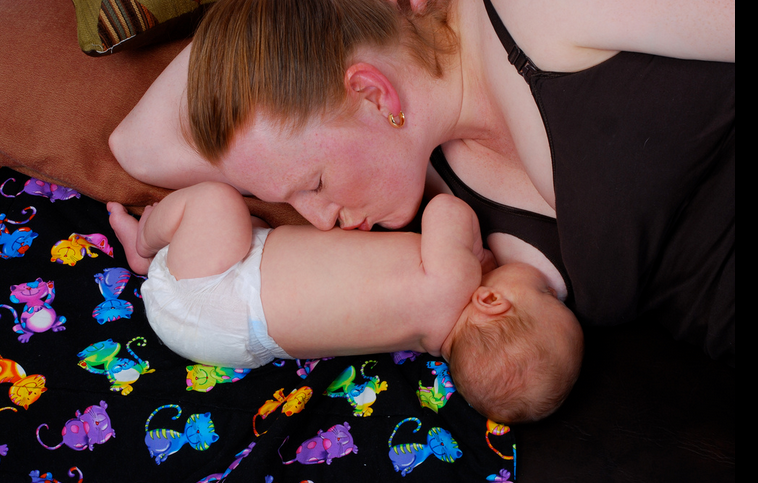Table of Contents[Hide][Show]
 There are few things more demoralizing than failing to feed your newborn despite your best efforts to breastfeed. In my practice and among friends, I have found myself asking repeatedly, “What is going on here? What’s with the supply drama?”
There are few things more demoralizing than failing to feed your newborn despite your best efforts to breastfeed. In my practice and among friends, I have found myself asking repeatedly, “What is going on here? What’s with the supply drama?”
Statistically, a full 50% of women are not able to meet their breastfeeding goals. There are many reasons for this, some of which include:
- Aggressive promotion of formula-feeding in hospitals including supplementation in NICUs.
- Limited lactation support and resources including insufficient family encouragement and shared community wisdom.
- Workplace impediments to pumping, and unfinanced maternity leaves.
- Pediatricians who overvalue growth charts and encourage unnecessary supplementation.
- Alcohol, nicotine.
- Infrequent feeding.
- Use of pacifiers.
- Depression and anxiety.
- Medications.
I’ve long been interested in what may be promoting insufficient supply on a physiologic level. I’ve come up with two interesting considerations – one environmental and one dietary:
Environmental pollutants — xenoestrogens
It is a meaningful concern that the modern woman’s breastmilk is a conduit for toxic substances. A recent study explored the relative significance of gestational versus lactational exposure to persistent organic pollutants and found that pregnancy was a more significant window of exposure, more directly correlated with adverse developmental outcomes.
Nonetheless, endocrine disruptors contribute to cumulative changes in thyroid function and estrogen load so that a woman’s hormonal milieu is skewed and her feedback loop between the brain (hypothalamus and pituitatry) and her glands may not be optimal. We know that synthetic estrogens in birth control can interfere with nursing, so it is hardly a leap to assume that environmental chemicals may be doing the same. These are most frequently found in plastics, pesticides, and cosmetics.
Insulin resistance and low milk supply
A fascinating study recently identified a potential biomarker gene expressed in the setting of insulin resistance and low milk supply. The significance of their hypothesis resonates with me because of how many women, of all body shapes and sizes, I see with early stage indication of insulin resistance that far precedes a diagnosis of diabetes and can also manifest as reactive hypoglycemia. Indicators of this state are high HemoglobinA1C, high or low fasting glucose and insulin, high triglycerides.
Clinically, these are the women who crave carbs and sweets, wake up without an appetite, or who can’t go more than two hours without eating (without risking relationships). Additionally, the study elucidates the complexity of breastmilk and inferiority of a one-size fits all, best-guess-at-nutrients formula. The researchers describe the 3 stages of breastfeeding as follows: “immune defense is the hallmark of the colostral stage, massive development of the protein synthesis infrastructure…the transitional stage, and massive synthesis of lipids…the mature stage”.
What to do BEFORE Baby is Born
Based on these theories, here are some things that women can do, preventatively, to help ensure a plentiful supply of breastmilk after baby is born:
- Take chlorella: based on a Japanese study where women who supplemented in pregnancy had lower levels of dioxins in their breastmilk and higher levels of IgA, and important indicator of immune performance. Other natural detox options are turmeric, cilantro, and garlic.
- Avoid BPA, chlorine, pesticides, and parabens.
- Adopt a low glycemic diet high in natural fats and proteins. The most important culprits are processed and artificial sugars and refined flour-containing foods (check labels…it’s everywhere).
- Have a low threshold to recruit the help of a lactation consultant. They can be miracle workers. A helpful online resource for breastfeeding support is www.kellymom.com.
As a staunch advocate for the impossible-to-replicate complexity of breastmilk, as well as the anti-inflammatory benefits to the mother, I look forward to sharing additional studies that further elucidate environmental drivers of this incredibly trying postpartum complication.
I also look forward to when some mechanical genius dramatically improves the operation of the annoying electric breastmilk pump!







I have given birth to two boys already and pregnant now. My previous pregnancy I suffered before the breast milk came, almost 2 weeks before it started flowing.
This time around I want the breast milk to come before baby arrive. What should I do.
Am in my 25th weeks
After trying fenugreek capsules and only getting a gassy baby with no milk increase, I was hesitant to try any other supplement but I am so GLAD I found “Healthy nursing tea”! I took this 3xday the next day I had a big increase in my supply. I was pumping 1-1/2 to 2oz from both breasts… I pumped over 3oz from one side just after a week!
I am insulin resistant and was diagnosed a few years after my first born. Now, pregnant with my second and a normal level of A1C, how can I make sure I will have enough breast milk. I didn’t with my first. Should I keep eating a low carb (PALEO) lifestyle? I am very anxious and want to make sure I’m doing everything right!
please, tell more in detail. dona berta